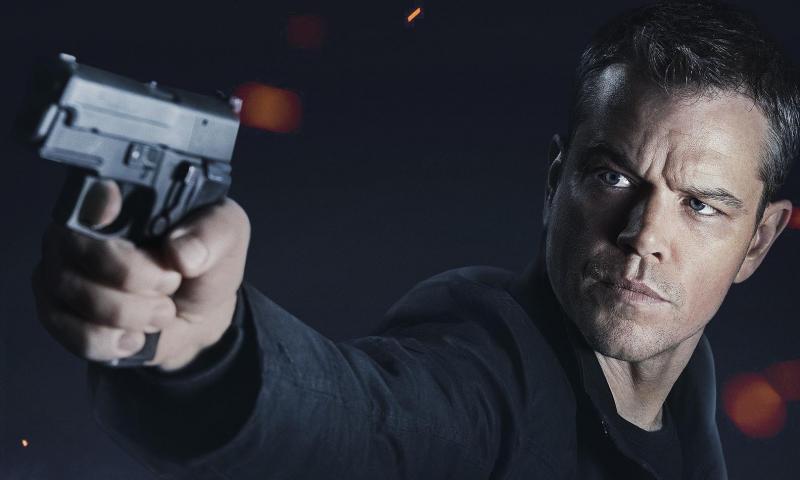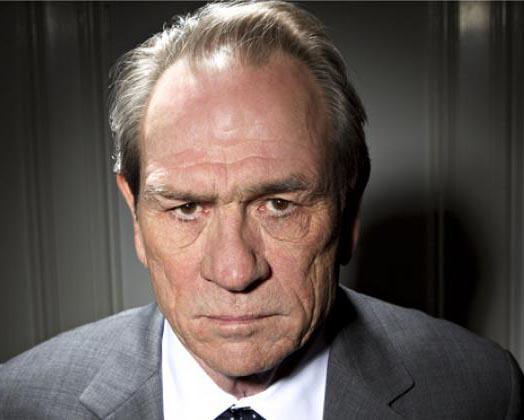Jason Bourne | reviews, news & interviews
Jason Bourne
Jason Bourne
Bourne to run (and run and run)

When Matt Damon's Jason Bourne makes his introductory appearance, as a bare-knuckle boxer somewhere in the lawless Greek-Albanian borderlands, it speaks volumes. Bourne is severely muscled-up, but he looks older, wearier and existentially imperilled. You could say much the same for this belated franchise addition, which is bristling with technology and intensely-detailed action scenes, but struggles to find much that wasn't done better, or more purposefully, in the earlier films.
Not least because the previous Bournes seem to be on permanent heavy rotation on ITV2, you're haunted by déjà vu. There's a fantastically destructive car chase more than slightly reminiscent of one in The Bourne Supremacy, from which Bourne casually walks way after a battering that would have crushed an entire tank regiment. There's a motorcycle pursuit in Athens by no means dissimilar to the one in Tangier from The Bourne Ultimatum. The pursuit scene in London's Paddington Basin is like the Waterloo sequence from Ultimatum moved a few miles across town. Bourne also gets to take another ride on the Eurostar (maybe that's why Matt Damon was urging Britons not to Brexit). The familiar throbbing, minor-key background music is present and correct (as is Moby's "Extreme Ways" over the closing credits), and they couldn't even resist that hoary old standby, the overhead landscape shot with the caption "Central Intelligence Agency Headquarters, Langley, Virginia" typing its way across the screen.
Bourne also gets to take another ride on the Eurostar (maybe that's why Matt Damon was urging Britons not to Brexit). The familiar throbbing, minor-key background music is present and correct (as is Moby's "Extreme Ways" over the closing credits), and they couldn't even resist that hoary old standby, the overhead landscape shot with the caption "Central Intelligence Agency Headquarters, Langley, Virginia" typing its way across the screen.
Story-wise, director-screenwriter Paul Greengrass and editor-screenwriter Christopher Rouse plunge us back into the swamp-like murk of the CIA's off-the-books operations. This time the action is kicked off by a computer hacking event at an Agency station in Iceland, perpetrated by rogue agent Nicky Parsons (Julia Stiles). Evidently appalled by the skulduggery and deceit she has witnessed, Parsons is giving it the full Edward Snowden and threatens to upload details of a catalogue of CIA operations (Blackbriar, Treadstone et al) to the net. She has also uncovered stunning revelations about Bourne's father and his career at the Agency, which naturally pique his curiosity.
 The sequence where she and Bourne meet up in Athens, playing cat-and-mouse with the CIA's increasingly incredible super-surveillance (if it was this good, terrorism would no longer exist), is the biggest and most bombastic set-up in the film. It's located amidst a full-blown riot in which protestors fight running battles against platoons of padded and helmeted cops, and while it's an astonishing feat of complex, split-second action film-making, letting it run for 40 minutes was wildly out of proportion. Instead of doing all that, maybe they could have developed the Parsons-Bourne back story – they had an affair of some sort back in his programmed-assassination days – but the opportunity is ignored.
The sequence where she and Bourne meet up in Athens, playing cat-and-mouse with the CIA's increasingly incredible super-surveillance (if it was this good, terrorism would no longer exist), is the biggest and most bombastic set-up in the film. It's located amidst a full-blown riot in which protestors fight running battles against platoons of padded and helmeted cops, and while it's an astonishing feat of complex, split-second action film-making, letting it run for 40 minutes was wildly out of proportion. Instead of doing all that, maybe they could have developed the Parsons-Bourne back story – they had an affair of some sort back in his programmed-assassination days – but the opportunity is ignored.
Also parachuted in from recent newspaper headlines is a social media entrepreneur who has allowed himself and his customers to be compromised by the security services. This is Aaron Kalloor (Riz Ahmed), creator of the Deep Dream platform, whom we see first being hailed as a tech-messiah by his adoring acolytes, then being verbally roughed up by charmless CIA honcho Robert Dewey (Tommy Lee Jones, pictured above, filling the obligatory sinister-old-bad-guy-from-the-past slot). The Agency gave him start-up money for Deep Dream, but now they're demanding payback in the form of all his confidential user information. Yet all this mysteriously leads nowhere.
 It feels like the film is searching for reasons to be relevant rather than being driven by any urgent imperatives of its own. The problem, of course, is that the series has outrun the original Robert Ludlum novels, and now that Bourne has gone through the Agency and come out the other side (and has his memory back) nobody knows quite what to do with him.
It feels like the film is searching for reasons to be relevant rather than being driven by any urgent imperatives of its own. The problem, of course, is that the series has outrun the original Robert Ludlum novels, and now that Bourne has gone through the Agency and come out the other side (and has his memory back) nobody knows quite what to do with him.
Except perhaps ambitious young CIA operative Heather Lee (Alicia Vikander, pictured above), who makes a bold (yet utterly implausible) bid to advance her career by bringing Bourne back in from the cold. With tedious predictability, the ending is a blatant setup for the next instalment.
The future of Arts Journalism
You can stop theartsdesk.com closing!
We urgently need financing to survive. Our fundraising drive has thus far raised £49,000 but we need to reach £100,000 or we will be forced to close. Please contribute here: https://gofund.me/c3f6033d
And if you can forward this information to anyone who might assist, we’d be grateful.

Subscribe to theartsdesk.com
Thank you for continuing to read our work on theartsdesk.com. For unlimited access to every article in its entirety, including our archive of more than 15,000 pieces, we're asking for £5 per month or £40 per year. We feel it's a very good deal, and hope you do too.
To take a subscription now simply click here.
And if you're looking for that extra gift for a friend or family member, why not treat them to a theartsdesk.com gift subscription?
more Film
 Can I get a Witness? review - time to die before you get old
Ann Marie Fleming directs Sandra Oh in dystopian fantasy that fails to ignite
Can I get a Witness? review - time to die before you get old
Ann Marie Fleming directs Sandra Oh in dystopian fantasy that fails to ignite
 Happyend review - the kids are never alright
In this futuristic blackboard jungle everything is a bit too manicured
Happyend review - the kids are never alright
In this futuristic blackboard jungle everything is a bit too manicured
 Robert Redford (1936-2025)
The star was more admired within the screen trade than by the critics
Robert Redford (1936-2025)
The star was more admired within the screen trade than by the critics
 Blu-ray: The Sons of Great Bear
DEFA's first 'Red Western': a revisionist take on colonial expansion
Blu-ray: The Sons of Great Bear
DEFA's first 'Red Western': a revisionist take on colonial expansion
 Spinal Tap II: The End Continues review - comedy rock band fails to revive past glories
Belated satirical sequel runs out of gas
Spinal Tap II: The End Continues review - comedy rock band fails to revive past glories
Belated satirical sequel runs out of gas
 Downton Abbey: The Grand Finale review - an attemptedly elegiac final chapter haunted by its past
Noel Coward is a welcome visitor to the insular world of the hit series
Downton Abbey: The Grand Finale review - an attemptedly elegiac final chapter haunted by its past
Noel Coward is a welcome visitor to the insular world of the hit series
 Islands review - sunshine noir serves an ace
Sam Riley is the holiday resort tennis pro in over his head
Islands review - sunshine noir serves an ace
Sam Riley is the holiday resort tennis pro in over his head
 theartsdesk Q&A: actor Sam Riley on playing a washed-up loner in the thriller 'Islands'
The actor discusses his love of self-destructive characters and the problem with fame
theartsdesk Q&A: actor Sam Riley on playing a washed-up loner in the thriller 'Islands'
The actor discusses his love of self-destructive characters and the problem with fame
 Honey Don’t! review - film noir in the bright sun
A Coen brother with a blood-simple gumshoe caper
Honey Don’t! review - film noir in the bright sun
A Coen brother with a blood-simple gumshoe caper
 The Courageous review - Ophélia Kolb excels as a single mother on the edge
Jasmin Gordon's directorial debut features strong performances but leaves too much unexplained
The Courageous review - Ophélia Kolb excels as a single mother on the edge
Jasmin Gordon's directorial debut features strong performances but leaves too much unexplained
 Blu-ray: The Graduate
Post #MeToo, can Mike Nichols' second feature still lay claim to Classic Film status?
Blu-ray: The Graduate
Post #MeToo, can Mike Nichols' second feature still lay claim to Classic Film status?

Add comment